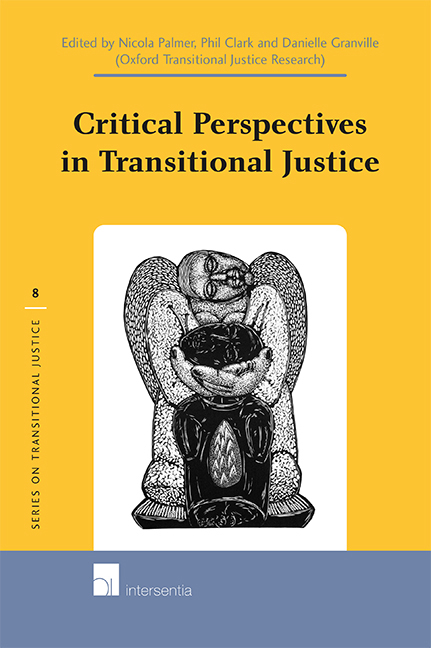Book contents
- Frontmatter
- Note
- Acknowledgements
- Contents
- Abbreviations
- Introduction
- Section 1 Critiquing Core Concepts in Transitional Justice
- Section 2 Accountability, Human Rights and the Rule of Law
- Section 3 Locality and Legitimacy
- Section 4 Memory, Ritual and Apology
- Section 5 Transitional Justice After Transition
- Contributors’ Biographies
- Series on Transitional Justice
6 - Human Rights, International Courts and Deliberative Democracy
Published online by Cambridge University Press: 22 December 2020
- Frontmatter
- Note
- Acknowledgements
- Contents
- Abbreviations
- Introduction
- Section 1 Critiquing Core Concepts in Transitional Justice
- Section 2 Accountability, Human Rights and the Rule of Law
- Section 3 Locality and Legitimacy
- Section 4 Memory, Ritual and Apology
- Section 5 Transitional Justice After Transition
- Contributors’ Biographies
- Series on Transitional Justice
Summary
INTRODUCTION
The aim of this chapter is to discuss some legal and judicial problems generated by situations of gross violations of human rights, and to do so from the perspective of a ‘communicative’ or ‘dialogical’ approach to criminal law. I am particularly interested in showing the richness and potential of this view, rooted in a deliberative theory of democracy, for dealing with hard criminal law cases. I do so by testing the deliberative view in three real and recent hard cases. The examples that I review are those of the 1983 self-amnesty law in Argentina (a self-amnesty passed by members of that country's military junta, before handing over power to the new democratic authorities); and the Barrios Altos and Simón cases, which also involved amnesties that sought to pardon gross violations of human rights (amnesties that, in these cases, were not passed by military regimes, but rather by democratic or quasi-democratic governments). I end the chapter with a reflection on the importance and possible implications of the dialogical approach.
THEORETICAL APPROACHES
What should judges do, in the face of past violations of human rights? In recent years, we have seen the influence of two very different views regarding how to deal with these difficult situations. One of these approaches focuses on the authority that enacts the law, while the second concentrates on the process that is established for dealing with hard criminal law cases. The first view, namely legal positivism, sees judges as simply ‘strict enforcers’ of the law, and the (valid) law as the product of an authorised official. The second view, in contrast, is not concerned with the issues of authority or community that were central to the first approach. Rather, it assumes that any tribunal is authorised to intervene in cases of massive violations, as far as it respects basic requirements of procedural fairness. It may be important to say a few words about each of these views.
JUSTICE AND LEGAL POSITIVISM
On legal positivist accounts, the authority of the law derives from the fact that it is imposed from above by an authorised sovereign. One of the most common positivist views simply asserts that ‘the law is the law’ (Gesetz ist Gesetz) and has to be obeyed because it is the law.
- Type
- Chapter
- Information
- Critical Perspectives in Transitional Justice , pp. 101 - 118Publisher: IntersentiaPrint publication year: 2012
- 1
- Cited by



